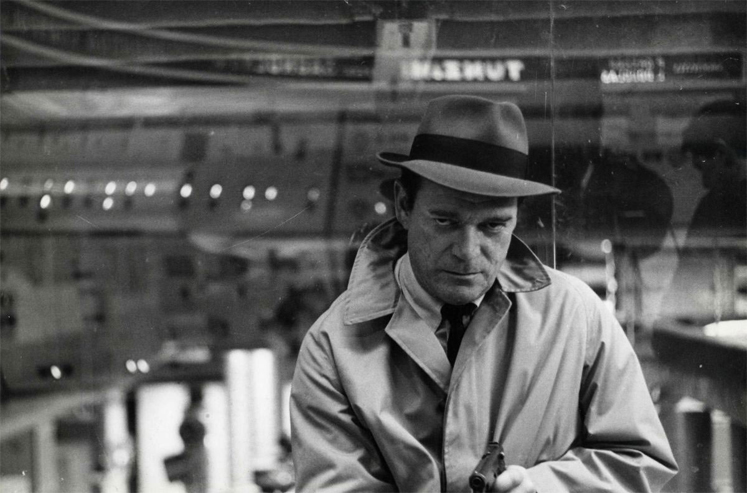The 50th anniversary of the release of Jean-Luc Godard’s Alphaville may not seem like a particularly momentous cultural milestone. But then, it is important to remember just what the filmmakers of the French New Wave and their films meant to the monumental cultural shifts of the 1960s. The student riots of the summer of 1968 had a prelude in the protest led by Godard and his cinephile, critic-filmmaker compatriots months earlier, when the French government closed their beloved Cinematheque. The language that surrounded the protests and the spirit of discontent were in many ways framed and established by these filmmakers, and Godard in particular. And to return to Alphaville is to see the sewing of the seeds of ’68 at its release in 1965.
Alphaville is a visually impressive and intellectually ambitious piece of cinema. There is a density to the language and the style, the embedded allusions, the mixed metaphors and visual canniness that makes for a film that operates on a dozen levels simultaneously. It is a sci-fi noir, a love story, a movie that is constantly questioning its own medium, and an astute reflection on time, rationality, poetry, and the nature and possibility of love. It’s a little depressing to encounter it, in all of its austere difficulty, and realize that no one is making films today which challenge the potential of the cinematic medium – what a film can be and how it can mean – as boldly and full-frontally as Godard was 50 years ago.
Shot on the streets of Paris in the winter of 1965, the world of Alphaville is a city of the future extracted from the reality of the present. Godard sets his film within sleek, glass-lined modernist architecture, crafting a sci-fi world out of reflections, glistening glass walls, blinking signs, and 1960s computers. In this way, Alphaville is both a vision of the future and a futurist take on the reality of the present day. It’s also a spinning, self-reflective play on genres and storytelling. Lemmy Caution is a journalist – or perhaps a secret agent – from the “Outlands” who is in Alphaville on an ambiguous mission. He is shadowed by various “seducer class” women, a witness to mass executions (replete with synchronized swimmers), chased down by shadowy agents, and interrogated by Alpha-60, the supercomputer that is the central command and inner logic of this strange, dystopian city.
In many ways, Godard’s film follows the tropes of his genres. As noir, Caution is cut in the mold of Humphrey Boggart in The Big Sleep (which Godard explicitly references). He is a solitary, masked man, whose stripped-down characterization pushes the character into the symbolic realm of existential warrior. As a sci-fi film, Alphaville flashes the influence of Aldous Huxley’s Brave New World and anticipates Stanley Kubrick’s 2001: Space Odyssey. The threat is the engineered society, a cruel and cold rationalism that, by efficiently organizing humanity, erodes human nature.
And yet the suggestion is not that this fictional world is some potential future humanity might create for itself, but rather that this world is a metaphoric vision of the here and now. As the Alpha-60 voiceover incants in its eerie, deep-toned gravel: “Nor is there in the so-called Capitalist world, or Communist world any malicious intent to suppress men through the power of ideology or materialism, but only the natural aim of all organizations to increase their rational structure.” It is an ironic admonition that suggests an anarchistic world view: mankind’s tendency to organize rational societies exerts a corrosive inertia on human nature.
This is, ultimately, the battle that Caution’s is waging: can the conscious individual break free from society? The means and methods of control are written into the fabric of Alphaville’s architecture and design. Alphaville is a world that drips in signs and symbols, from mathematical formulas to blinking arrows that direct and misdirect. It is a world where the dictionary has replaced the bible, and the mechanical system of government redacts language to exert control. What is really at stake by the film’s end is not merely the infiltration and destruction of a malicious society, but the ability of Caution to undo Alphaville’s effects, to take one of its citizens, Natasha, daughter of the scientist who created Alpha-60, and counteract her mis-education. The film ends with a long dialogue in which Natasha slowly regains a comprehension of words that have been denied her – conscious, consciousness, the ability to ask “why” and not just state “because.” It is ultimately an effort to help Natasha understand the self, and to see the self as distinctive from the other. Finally, she states slowly: “I. Love. You.”
“Reality is too complex,” an opening voiceover announces in Alphaville’s opening sequence. “But legend embodies it in a form that is understandable.” Godard’s film is a kind of legend making. It is a dangerous game, because both legend and propaganda partake in the repackaging of reality. But Godard’s film strives to filter reality through a medium that doesn’t distort the authenticity of real experience. His film situates itself within the archetype of the Orpheus myth. The film ends with Caution and Natasha driving out of Alphaville into the Outlands, like Orpheus leading Eurydice out of the underworld.
It is this action of “awakening” that approaches Godard’s moral and political vision. Caution awakens Natasha to the possibility of poetic meaning, and dismantles Alpha-60 with a metaphoric riddle that pushes the computer towards a self-consciousness that is impossible for the machine, and therefore destroys it. Poetry and metaphor offer meaning that is anathema to the inner logic of Alphaville, to its cruel and controlling rationality, to the way it recreates humanity in the image of the machine. In the self-consciousness of Godard’s own project, his crafting of this myth of social awakening, the filmmaker seems to suggest that the cinema affords an analogous escape. Art is an act of vocabulary expansion – both philosophical and aesthetic. It is an agent of a political and intellectual liberation, an urging onwards towards an act of salvific rebellion.






